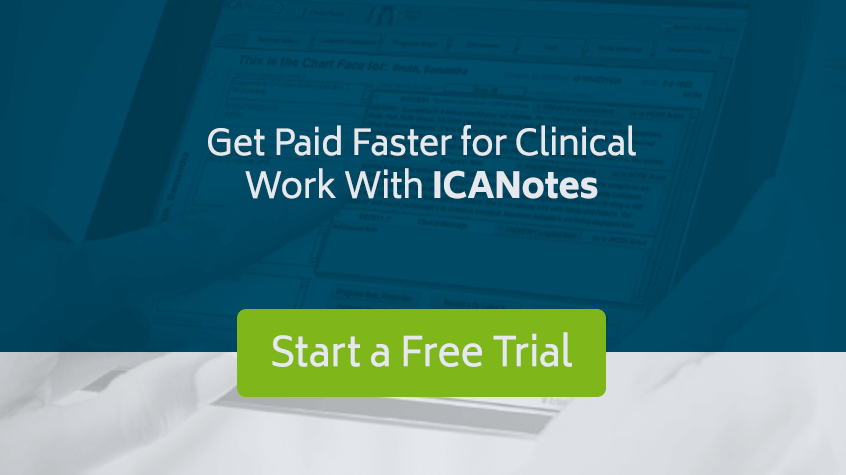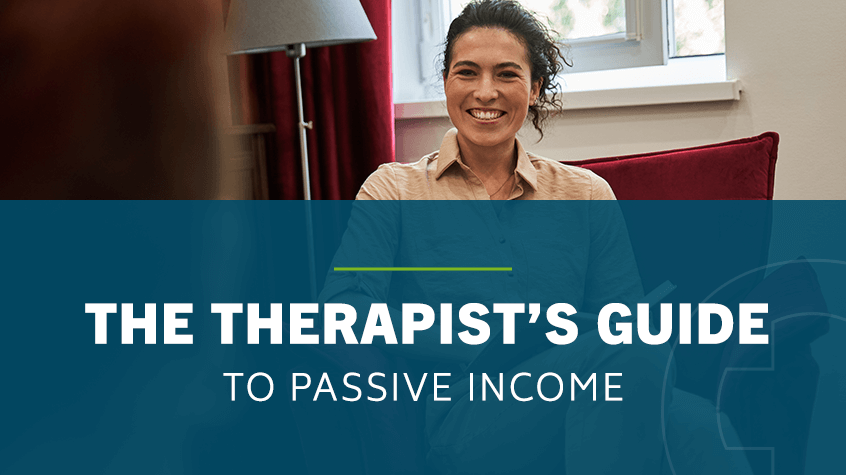
Passive Income for Therapists: Exploring Revenue Streams Beyond Therapy Sessions
Becoming a therapist or counselor is a rewarding career that enables you to engage in your passion for helping others heal. However, it's not uncommon for those who studied clinical, counseling or applied psychology to have high student debt-to-income ratios. One study found that students pursuing a doctoral degree in these sectors end up owing more than twice as much in student debt as they earn, even four years after graduation.
Fortunately, actively providing therapy sessions and evaluations is not the only stream of income available to you as a behavioral health clinician. If you're looking for ways to make more money to repay student debt or simply to give yourself more financial flexibility, you can certainly do so without adding more clients to your schedule. We've created this guide for you to discover how to generate passive income as a therapist.
What Is Passive Income for Therapists?
Passive income refers to a strategy that enables individuals to earn income with minimal labor. As the name suggests, passive income provides a steady stream of income that eventually pays out automatically without requiring you to be actively involved.
Passive income is often associated with the real estate industry, but there are endless ways to earn side income that relate to your specialty and education. Years of education, clinical experience and knowledge have equipped you with the means to increase your earnings without seeing more clients per week.
As a therapist, diversifying your income can enable burnout prevention, improved flexibility and the ability to make purposeful choices about the level of client work you choose to provide.
What to Know Before Getting Started With Passive Income
It's important to note that while generating passive income does not often require an ongoing effort, it does take work to get it started.
Nowadays, people can find almost anything on the internet, so making a genuine effort is important for success. Disingenuous attempts at making extra money online won't resonate with audiences. As a therapist, your purpose is to serve. You take pride in your work providing therapy sessions. Applying those same skills to passive income can help you create a high-quality, informational product or solution you're proud to share.
Additionally, be sure you're always operating within the ethical and legal bounds of your licensing board. Before exploring alternative income stream avenues, determine whether any of these strategies that require your expertise could put your license at risk.
FREE DOWNLOAD
Our Passive Income Starter Kit for Mental Health Therapists, is a comprehensive guide designed to help you diversify your income without increasing your client load. Inside, you'll find 10 actionable strategies tailored to your expertise, including ideas for creating e-books, online courses, and membership communities, along with practical steps for implementation, compliance tips, and marketing insights to ensure your success in building sustainable revenue streams.
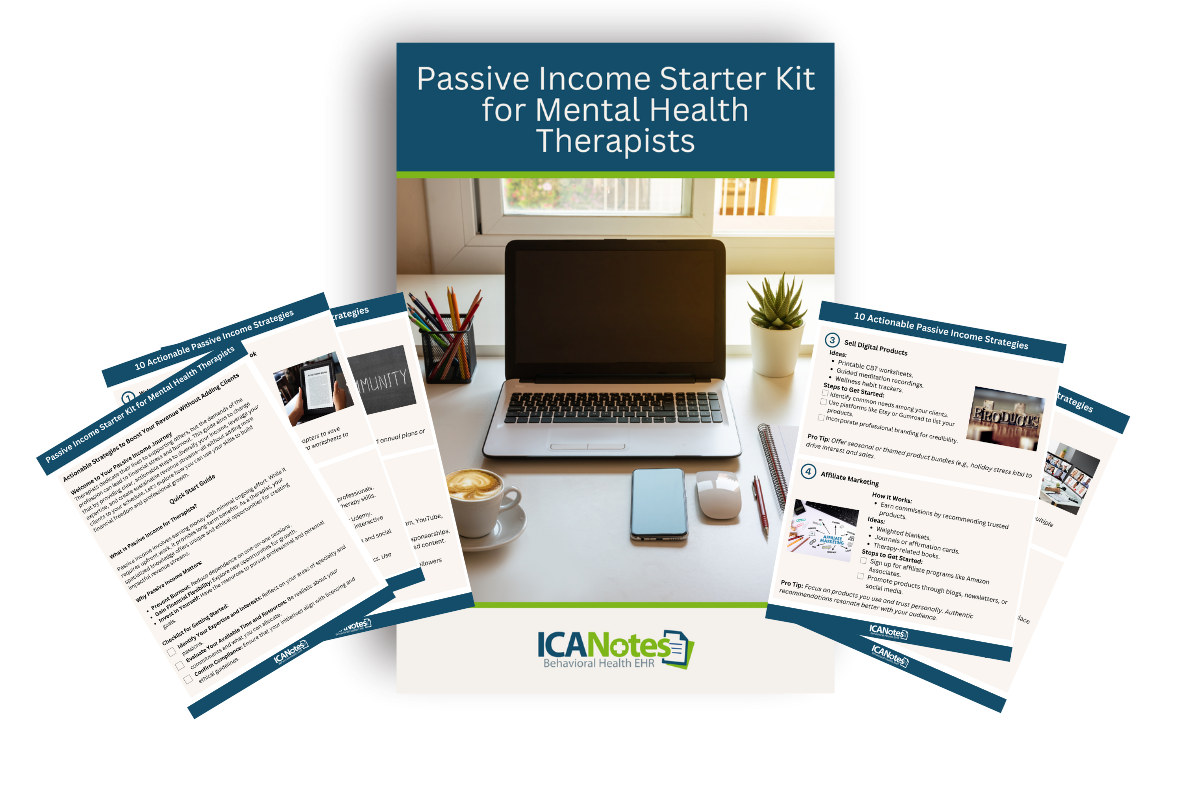
10 Passive Income Ideas for Counselors and Therapists
All passive income strategies require varying levels of involvement and effort. Here are some of our top tips for diversifying your income stream as a behavioral health clinician.
1. E-Book Publishing
If you love to write and share your knowledge with others, an e-book is an ideal way to leverage your expertise. Books can be a valuable resource that allows you to dive deeper into your interests, specialty or niche as a therapist. Publishing an e-book, whether it's self-published or traditionally published, can create passive income.
Publishing online as an e-book makes it easier — and cheaper — to distribute your book, and it allows better accessibility to readers. Eliminating the physical publishing requirements means you can get your book out there faster and keep more money from sales in your pocket.
As a behavioral health clinician, you have the experience, knowledge and communication skills necessary to be a writer. You might write and sell an e-book about certain mental health conditions, changes in treatment or mental health tips to help others. As a different approach, you could write about the steps it took for you to become a successful therapist and what other potential clinicians can expect about the process.
If writing a book isn't something you'd like to do, you can also create a therapeutic workbook or journal. A therapeutic workbook is an interactive way for readers to learn. For instance, a cognitive behavioral therapy (CBT) workbook would include written exercises to help patients alter negative thought patterns, develop healthy coping skills and address a range of mental health concerns.
2. Online Courses
Perhaps you want to add to your income but don't have the availability to take on more clients. Teaching online or e-courses can help you reach a wider audience who want to learn and engage on their own time. In your case, you could host online courses about different therapy treatments or psychology topics, such as:
- Depression.
- Anxiety.
- Substance abuse.
- Bipolar disorder.
- Burnout.
- Attention-deficit/hyperactivity disorder (ADHD).
- Cognitive behavioral therapy (CBT).
- Dialectical behavior therapy (DBT).
- Eye movement desensitization and reprocessing.
You can offer these paid courses to users looking for more information on mental health or to psychology students looking to expand their knowledge from someone with real experience. Online training courses for clinicians can also help you feel fulfilled in helping the next generation of mental health professionals expand their toolkits before joining the workforce. Pre-recording these courses means you can earn income without teaching the material repeatedly.

3. Affiliate Marketing
Selling products may not be the first thing you think of when it comes to generating passive income as a counselor. However, you can earn commissions by promoting products you truly believe in. Affiliate marketing income comes from commissions per product or service that you help sell for another business.
A key to being a successful marketing affiliate — and not a salesperson — is to only promote products or brands you genuinely love and think your audience will value. You might decide to earn a commission for products tailored to improving mental health, such as:
- Essential oil diffusers.
- Gratitude journals.
- Weighted blankets.
- Affirmation cards.
- Books about therapeutic practices.
Many businesses provide an affiliate link that you can post on your website, blog or social media platform. You'll earn a commission any time a user buys the product through your link.
4. Digital Products
There are endless possibilities for informational and educational products you can create and sell online. E-books are one example we already touched on. Here are some other ideas:
- Courses
- Therapeutic worksheets
- Digital templates and tools
- Educational resources
- Downloadable guides
- Daily therapeutic journals
- Presentations
- Paid newsletters
- Audio meditations
- Printable wellness trackers
You can develop these digital tools and resources by identifying some of the common pain points you've noticed in your clientele or the industry as a whole. Drawing inspiration from your real-life experience will help you create a valuable, ethical product. For instance, you could compile a self-esteem worksheet with in-depth exercises and reflection questions for those with anxiety or a 60-minute guided meditation for people with panic disorder.
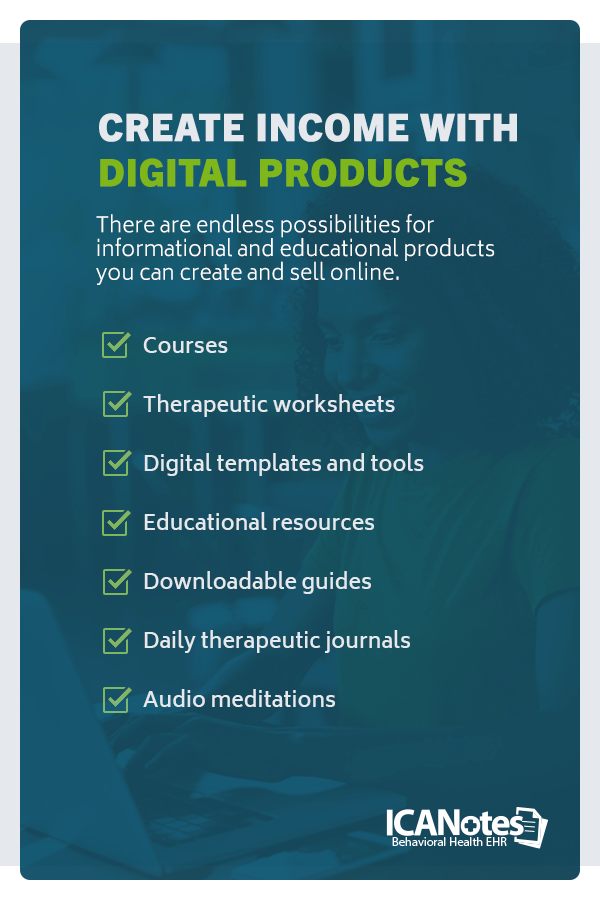
5. Membership Sites
You can share your evidence-based practices and strategies with clinical students by offering exclusive content through a membership. Members pay a monthly or annual subscription fee to access your curated content, which could include challenges you've experienced in the behavioral health industry, caseload management tools and tips for streamlining documentation. Your membership could also allow members to communicate and connect with other members, helping you build a community of those interested in the topic.
Starting a paid membership can help solidify you as an experienced leader in your chosen niche, such as addiction, eating disorders or anger management. Members pursuing behavioral health degrees or licenses can refer to your membership for valuable tools and support.
6. Social Media and Content Creation
Having an online presence as a therapist can help you build an audience and increase your practice's reputation and visibility. Utilizing popular online platforms is an easy — and free — way to educate others about mental health topics and connect them with appropriate resources, including your services! Content creation requires more work than other passive income strategies but can be an effective way to expand your reach and influence.
You can engage an audience, market your therapy practice or digital products and earn income at the same time with these social media platforms:
- TikTok
- X (Twitter)
- YouTube
There's potential to earn money by reaching out to sponsors who offer paid advertisements to appear on your content. Try reaching out to brands with products or services that align with your audience to earn passive income while sharing behavioral health topics.
Before you know it, you could become a mental health content creator on YouTube or another platform. Some of your posts might include the following topics:
- Grounding techniques
- Self-care
- Coping strategies
- Wellness tips
If this passive income strategy sparks your interest, be sure it doesn't interfere with your obligation to uphold a code of ethics and boundaries between your personal and professional digital presence.
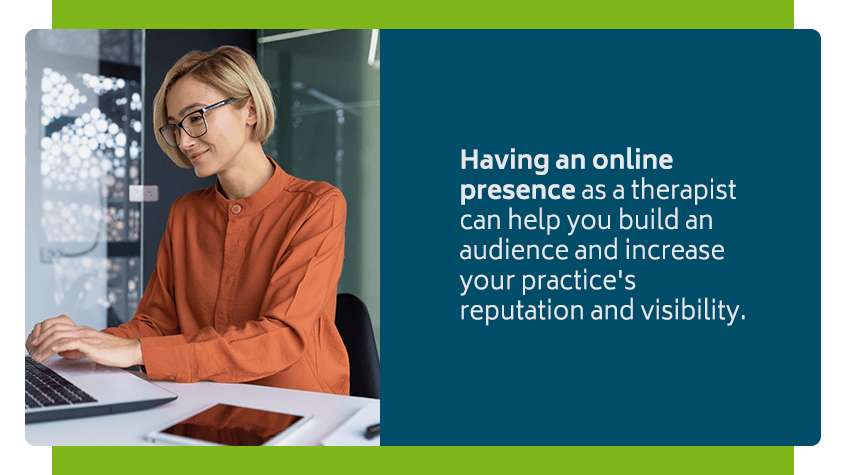
7. Webinars and Online Workshops
Just like most online courses, you can also pre-record webinars and workshops that users can access at any time. All you'd need to do is develop the topic or lecture, record it and earn passive income through sales. Of course, you could also host live webinars and events on specialized therapy topics, allowing your audience to ask questions and engage with others.
Some mental health topics you could explore include:
- Strengthening personal resilience.
- Growing mental health awareness.
- Developing healthy self-care habits.
- Understanding psychological disorders.
- Discussing evidence-based practices and therapy techniques.
If you're passionate about teaching and don't mind investing some extra time to help people see progress in themselves, this could be a great fit for you.
8. Podcasting
Podcasts have skyrocketed in popularity in recent years, reaching millions of listeners. Similar to a YouTube channel, you can start a podcast as a way to earn passive income in the behavioral health field. You can monetize your podcast through advertising, sponsorships or paid access to access your knowledge. With so many free recording and editing tools available today, starting a podcast might be easier than you think.
You could share stories and self-help tips or discuss questions from the audience to build a relationship and trust with your community. You might also share insights from what you learned when building your own private practice, and you can interview guests who are also in the industry. Featuring other professionals on your podcast can be a mutually beneficial event as it allows you to make meaningful connections with other therapists and reach a wider audience.
You can help gain an audience for your podcast by sharing it on your website or social media platforms. Be sure to share what your podcast will bring to the table regarding psychology and behavioral health or to share snippets of each episode for free to get people interested.
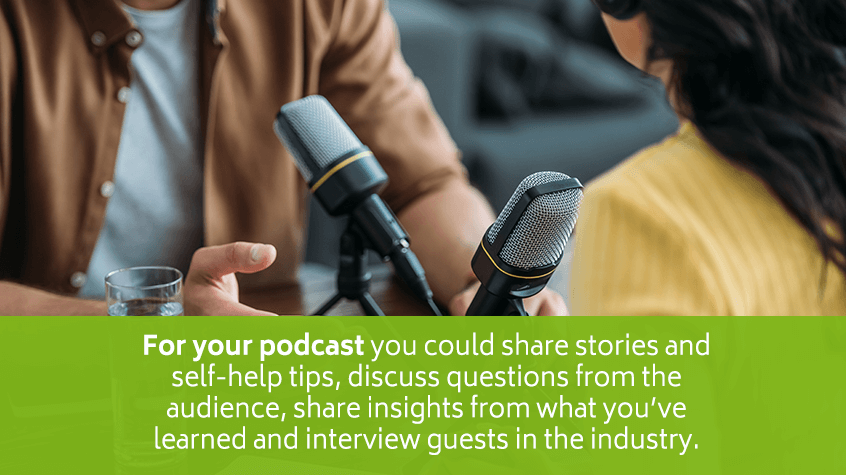
9. Mental Health Blogs
In addition to utilizing social media platforms, creating your own mental blog or website is an effective way to draw an audience. You can earn extra income by writing blog posts where readers pay to access your articles on a regular basis. A mental or behavioral health blog can help you establish authority as a clinician and allow you to share your knowledge with patients, psychology students and the general public. You can design your blog and choose your topics as you wish.
To make your blog entries even more enticing, be sure to create an engaging website that's easy to navigate. Use industry buzzwords to help enhance your search engine rankings and increase your credibility and visibility. Potential clients and readers likely want to see what sets your practice apart from others in the industry, including your:
- Education.
- Qualifications.
- Experience.
- Services.
- Therapeutic approaches.
- Contact details.
Remember, your website or blog is the digital face of your behavioral health practice. Crafting informative content, making it easy for clients to reach out and writing guest articles can present you as a well-rounded provider and help you earn more.
10. Public Speaking Engagements
There are many opportunities for therapists and behavioral health professionals to speak at schools, organizations, workshops and events to earn extra money. You can be a public speaker for online workshops or offer to be on a panel at a mental health conference. This alternative income strategy for therapists requires more time and effort, but it offers many benefits.
For instance, public speaking gigs allow you to promote yourself and your practice. After you speak, you can pass out business cards with your website or social media platforms to help connect people with your services. You can also network with other professionals at these events to gain a sense of what people are engaging within the industry. Speaking engagements may improve your practice's credibility and trustworthiness.
If you're experiencing clinician imposter syndrome — which can often be nerve-wracking for anyone — you can always start with online speaking engagements. Once you build your confidence in your chosen topic or niche, you can start charging for these events. However, keep in mind that as a licensed behavioral health professional, you bring valuable perspective and expertise that your clients already esteem.
If you're asked to do a public speaking engagement, it's because other professionals realize what you have to offer. Knowing your worth as a clinician is the first step toward breaking out into other income streams.
Get Paid Faster for Clinical Work With ICANotes
Therapists and counselors like you devote their time to helping others manage mental health conditions and work through emotional challenges. If you want to expand your therapy services to earn more money but don't have the time, these passive income strategies might work for you. Reducing manual tasks offers even more support and flexibility. At ICANotes, we're committed to helping therapists and behavioral health clinicians reduce documentation time.
Instead of spending hours hand-writing lengthy progress notes and treatment plans, our premier electronic health record (EHR) reduces your documentation burden so you can get paid faster. With more time on your hands, you can explore diverse income streams. Our innovative charting solution makes it easy to create therapy notes, schedule appointments and streamline billing. Request a live demo or start your free trial today to see why so many clinicians rely on ICANotes.
Start Your Free Trial Today

